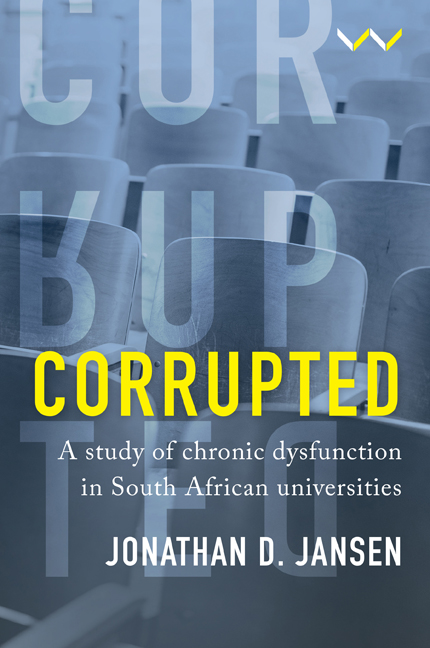Book contents
- Frontmatter
- Contents
- Acknowledgements
- Acronyms and Abbreviations
- Map: South African Universities
- Chapter 1 A Study of Chronic Dysfunction in Universities
- Chapter 2 Historical Roots of Dysfunction: Shaping the South African University
- Chapter 3 Dysfunctionality in Universities: A Political Economy Perspective
- Chapter 4 A Personal Journey Through the Political Economy of Universities
- Chapter 5 Casting Long Shadows: How History Shapes the Politics of Universities In South Africa
- Chapter 6 The University as a Concentrated and Exploitable Resource
- Chapter 7 The University as a Criminal Enterprise
- Chapter 8 The Micropolitics of Corruption in Universities
- Chapter 9 The Twin Roots of Chronic Dysfunctionality in Universities
- Chapter 10 Rethinking and Rebuilding Dysfunctional South African Universities
- Appendices
- Notes
- References
- Index
Chapter 7 - The University as a Criminal Enterprise
Published online by Cambridge University Press: 29 November 2023
- Frontmatter
- Contents
- Acknowledgements
- Acronyms and Abbreviations
- Map: South African Universities
- Chapter 1 A Study of Chronic Dysfunction in Universities
- Chapter 2 Historical Roots of Dysfunction: Shaping the South African University
- Chapter 3 Dysfunctionality in Universities: A Political Economy Perspective
- Chapter 4 A Personal Journey Through the Political Economy of Universities
- Chapter 5 Casting Long Shadows: How History Shapes the Politics of Universities In South Africa
- Chapter 6 The University as a Concentrated and Exploitable Resource
- Chapter 7 The University as a Criminal Enterprise
- Chapter 8 The Micropolitics of Corruption in Universities
- Chapter 9 The Twin Roots of Chronic Dysfunctionality in Universities
- Chapter 10 Rethinking and Rebuilding Dysfunctional South African Universities
- Appendices
- Notes
- References
- Index
Summary
There aren't a lot of ways out of poverty and universities provide one of those ways.
At around five fifteen on 22 May 2018, Professor Gregory Kamwendo parked his car outside a flat in Empangeni, a beautifully situated town overlooking the Indian Ocean in the north-eastern part of KwaZulu-Natal. Malawian-born, he was an accomplished scholar in the field of sociolinguistics and dean of the faculty of arts at the University of Zululand (UZ). The man who pumped bullets into Kamwendo's upper body as he sat in the parked car on that fateful Tuesday evening was an inkabi (assassin). He had been hired by a taxi owner, Oscar Mthiyane, who himself had been called out of the blue to arrange the murder. The caller was Selby Nkuna, a one-time lecturer at the University of Zululand. The 53-year-old professor died bleeding in his car as the two men sped away in a getaway car driven by Mthiyane. On 29 November 2018 detectives arrested Mthiyane and Nkuna, and in October 2020 the two killers were sentenced to life in prison.
Why would a university lecturer murder an academic dean? Quite simply, because the dean was disrupting a revenue stream that enriched the lecturer. Kamwendo had exposed a fraudulent PhD operation in which the university allegedly sold poorly printed doctoral diplomas. It did not help that there was already bad blood between the two men because Kamwendo had testified in an arbitration case against Nkuna for physically assaulting a student. Nkuna had threatened to send Kamwendo ‘back to Malawi in a coffin’. The murder took place in the context of institutional dysfunction, as one statement so poignantly captured: ‘In grieving the loss of a man of such principle and integrity, we call for justice, not just in prosecuting his murderers but in addressing the institutional and system-level dynamics that his murder draws attention to.’
INSTITUTIONALISED CORRUPTION OF THE ACADEMIC ENTERPRISE
The PhD scandal was matched by a much bigger case of certificate fraud at UZ in 2016. An investigation there showed that as many as 4 000 people might have paid for their degrees over a period of twenty years. Between 400 and 500 of those certificates appeared to involve teaching qualifications. In one instance, five staff members made R260 000 selling 15 fake degrees. About 80 students were deregistered after it was found they did not even have matric (school-leaving) certificates.
- Type
- Chapter
- Information
- CorruptedA Study of Chronic Dysfunction in South African Universities, pp. 141 - 166Publisher: Wits University PressPrint publication year: 2023



